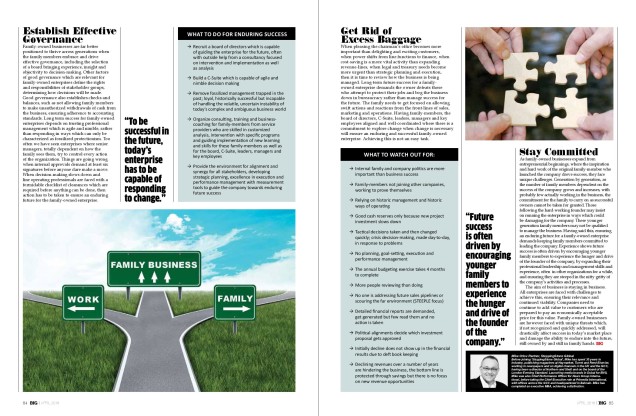
We have recently been examining how to ensure long-term future successes for family-owned businesses. From these reviews we have uncovered guiding principles, hammered out in the furnace of often heated debate and discussion. Perhaps the most important agreed factor for an enduring enterprise is you cannot secure future growth of a family-owned company using yesterday’s methods which built today’s successes.
Future success will not be stimulated unless political infighting of family-members is controlled. These growing numbers of family-members have needs which have to be fulfilled but these needs ought to be aligned to ensure momentum for the enterprise, otherwise the leadership dissolves into armed camps attempting to point the company in different directions, ensuring no forward movement and ultimate degeneration and collapse.
To be successful in the future, today’s enterprise has to be capable of responding to change and this is particularly true for family-owned concerns where there is a tendency to attempt to hang-on to old ways for too long. Family-owners have historically taken longer to make changes to the way things are done in their business than companies with a wider range of shareholders. In a corporate entity the pressure to respond speedily to change is more acute, driven by a broader range of voices influencing stock-market reactions; the board of directors has a responsibility for the price of shares as well as to all other stakeholders.
Family-owned businesses are far better positioned to thrive across generations when the family-members embrace and drive effective governance, including the selection of a board bringing experience, insight and objectivity to decision-making. Other factors of good governance which are relevant for family-owned enterprises define the rights and responsibilities of stakeholder-groups, determining how decisions will be made. Good governance also establishes checks and balances, such as not allowing family-members to make unauthorized withdrawals of cash from the business, ensuring adherence to accounting standards.
Long term success for family-owned enterprises depends on trusting professional management which is agile and nimble, rather than responding in ways which can only be characterized as fossilized protectionism. Too often we have seen enterprises where senior managers, totally dependent on how the family sees them, try to control every action of the organization. Things are going wrong when internal approvals demand at least six signatures before anyone dare make a move. When decision making slows down and line operating professionals are faced with a formidable checklist of clearances which are required before anything can be done, then action has to be taken to ensure an enduring future for the family-owned enterprise.
When pleasing the chairman’s office becomes more important than delighting and exciting customers, when power shifts from line functions to finance, when cost-savings are a more vital activity then expanding revenue-lines, when legal and treasury needs become more urgent than strategic planning and execution, then it is time to review how the business is being managed. Long-term future success for a family-owned enterprise demands the owner defeats those who attempt to protect their jobs and bog the business down in bureaucracy rather than manage success for the future. The family needs to get focused on allowing swift actions and reactions from the front-lines of sales, marketing and operations.
Having family-members, the board of directors, C-Suite, leaders, managers and key employees aligned and well-coordinated where there is a commitment to explore change when change is necessary will ensure an enduring and successful family-owned enterprise. Achieving this is not an easy task.
As family-owned businesses expand from entrepreneurial beginnings where the inspiration and hard work of the original family-member who launched the company drove success, they face unique challenges. Generation by generation, as the number of family members dependent on the success of the company grows and increases, with probably few actually working in the business, the commitment for the family to carry on as successful owners cannot be taken for granted. Those following the hard-working founder may insist on running the enterprise in ways which could be damaging for the company.
These younger generation family-members may not be qualified to manage the business. Having said this, ensuring an enduring future for a family-owned enterprise demands keeping family-members committed to leading the company. Experience shows future success is often driven by encouraging younger family-members to experience the hunger and drive of the founder of the company, by expanding their professional leadership and management skills and experience, often in other organizations for a while, and ensuring they are steeped in the nitty gritty of the company’s activities and processes.
The aim of business is staying in business. All enterprises are faced with challenges to achieve this, ensuring their relevance and continued viability. Companies need to continue to add value to customers who are prepared to pay an economically acceptable price for this value. Family-owned businesses are however faced with unique threats which, if not recognized and quickly addressed, will drastically affect success in today’s market place and damage the ability to endure into the future, still owned by and still in family-hands.
What to do for enduring success
- Recruit a board of directors which is capable of guiding the enterprise for the future, often with outside help from a consultancy focused on intervention and implementation as well as analysis
- Build a C-Suite which is capable of agile and nimble decision making
- Remove fossilized management trapped in the past; loyal, historically successful but incapable of handling the volatile, uncertain instability of today’s complex and ambiguous business world
- Organize consulting, training and business-coaching for family-members from service providers who are skilled in customized analysis, intervention with specific programs and guiding implementation of new learning and skills for these family-members as well as for the board, C-Suite, leaders, managers and key employees
- Provide the environment for alignment and synergy for all stakeholders, developing strategic planning, excellence in execution and performance management with measurement tools to guide the company towards enduring future success
What to watch out for:
- Internal family and company politics are more important than business success
- Family-members not joining the company as executives
- Family-members not joining other companies, working to prove themselves
- The organization becomes risk averse, living in its past glory
- Relying on historic management and historic ways of operating
- Good cash reserves only because new project investment slows down
- Tactical decisions taken and then changed quickly; crisis decision-making, made day-to-day, in response to problems
- No planning, goal-setting, execution and performance management
- Analysis paralysis is running wild in the business
- The annual budgeting exercise takes 4 months to complete
- More time is spent on reviewing the past rather than focusing on the future
- More people reviewing than doing
- No one is addressing future sales pipelines or scouring the far environment (STEEPLE focus)
- Reviews are focused on ‘budget vs actuals’ rather than ‘year on year’ actuals
- Detailed financial reports are demanded, get generated but few read them and no action is taken
- Board meeting are long and indecisive
- Political alignments decide which investment proposal gets approved
- The size of head office increases
- Initially decline does not show up in the financial results due to deft book keeping
- Declining revenues over a number of years are hindering the business, the bottom line is protected through savings but there is no focus on new revenue opportunities
Challenges for the family-owned business:
- Each family-member has a different vision of the purpose for the business
- Lack of outside opinions and diversity on how to operate the business
- Lack of written strategy; no documented plan or long term planning
- Poor governance and growing informality
- Absence of clear policies and business norms for family members
- Family problems and emotions
- Tunnel vision
- Dividends, salaries, benefits and compensation for non-participating family members are not clearly defined and justified
- Roles and responsibilities not clearly defined.
- Lack of talent from outside the family
- Family-members in executive positions who are not qualified or lack the skills and abilities for the organization
- Inability to fire family-members
- High turnover of non-family members
- Lack of succession planning
- Most family organizations do not have a plan for handing the power to the next generation, leading to further political conflicts and divisions
- Non-existent long term planning to cover the necessities and realities of older members when they leave the company
- Centralized and traditional paternalistic command and control
- Fear of failure; need to fail often, cheaply and quickly to stimulate innovation
- Communication problems
- Lack of revenue growth
- Problems due to lack of capital and new investment or resistance to re-investment in the business

